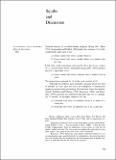| dc.contributor.author | Almotahari, Mahrad | |
| dc.date.accessioned | 2011-11-07T20:36:38Z | |
| dc.date.available | 2011-11-07T20:36:38Z | |
| dc.date.issued | 2011-07 | |
| dc.identifier.issn | 0024-3892 | |
| dc.identifier.issn | 1530-9150 | |
| dc.identifier.uri | http://hdl.handle.net/1721.1/66958 | |
| dc.description.abstract | Standard theories of so-called donkey anaphora (Kamp 1981, Heim
1982, Groenendijk and Stokhof 1991) predict that sentence (1) is truth conditionally
equivalent to (2).
(1) Every farmer who owns a donkey beats it.
(2) Every farmer who owns a donkey beats every donkey that he owns.
I will refer to the proposition expressed by (2) as the strong reading
of (1). A nonstandard theory, defended by King (1993, 2004), predicts
that (1) is equivalent to (3).
(3) Every farmer who owns a donkey beats a donkey that he owns. The proposition expressed by (3) is the weak reading of (1). Although the authors I have referred to disagree about how best
to interpret (1), they agree that (1) is not ambiguous; it semantically
expresses no more than one reading. Not everyone shares this opinion,
though. Schubert and Pelletier (1989), Kanazawa (1994), and Chierchia
(1995) suggested that sentences relevantly like (1) are ambiguous.
2 Consider, for example, sentences (4)–(6).
(4) Everyone who owns an umbrella leaves it at home on a sunny day.
(5) Everyone who owns an umbrella uses it on a rainy day. | en_US |
| dc.language.iso | en_US | |
| dc.publisher | MIT Press | en_US |
| dc.relation.isversionof | http://dx.doi.org/10.1162/LING_a_00056 | en_US |
| dc.rights | Article is made available in accordance with the publisher's policy and may be subject to US copyright law. Please refer to the publisher's site for terms of use. | en_US |
| dc.source | MIT Press | en_US |
| dc.title | An Antinomy about Anaphora | en_US |
| dc.type | Article | en_US |
| dc.identifier.citation | Almotahari, Mahrad. “An Antinomy about Anaphora.” Linguistic Inquiry 42 (2011): 509-517. © 2011 MIT Press. | en_US |
| dc.contributor.department | Massachusetts Institute of Technology. Department of Linguistics and Philosophy | en_US |
| dc.contributor.approver | Almotahari, Mahrad | |
| dc.contributor.mitauthor | Almotahari, Mahrad | |
| dc.relation.journal | Linguistic Inquiry | en_US |
| dc.eprint.version | Final published version | en_US |
| dc.type.uri | http://purl.org/eprint/type/JournalArticle | en_US |
| eprint.status | http://purl.org/eprint/status/PeerReviewed | en_US |
| dspace.orderedauthors | Almotahari, Mahrad | en |
| mit.license | PUBLISHER_POLICY | en_US |
| mit.metadata.status | Complete | |
